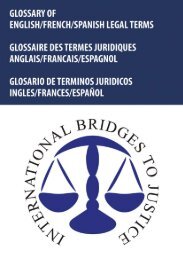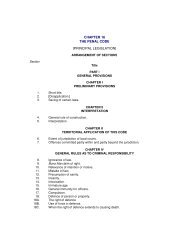9 FAM 40.21(a) Crimes Involving Moral Turpitude - Notes - Criminal ...
9 FAM 40.21(a) Crimes Involving Moral Turpitude - Notes - Criminal ...
9 FAM 40.21(a) Crimes Involving Moral Turpitude - Notes - Criminal ...
Create successful ePaper yourself
Turn your PDF publications into a flip-book with our unique Google optimized e-Paper software.
U.S. Department of State Foreign Affairs Manual Volume 9 - Visas<br />
Pre-trial Actions<br />
(CT:VISA-1318; 09-24-2009)<br />
a. An applicant has not been convicted of a crime if he or she:<br />
(1) Is under investigation;<br />
(2) Has been arrested or detained;<br />
(3) Has been charged with a crime; or<br />
(4) Is under indictment.<br />
b. However, such facts may indicate that some other basis of inadmissibility<br />
may exist (e.g., second clause of INA 212(a)(2)(C), INA 212(a)(1), etc.).<br />
At your discretion, you may refuse any under INA 221(g) which involves<br />
an alien charged, but not convicted of a crime to await the outcome of<br />
the proceedings, if the outcome is imminent, or to permit local authorities<br />
in appropriate cases to take steps to prevent the departure of the alien<br />
from their jurisdiction. Where applicable, in the case of a nonimmigrant<br />
visa applicant charged with a crime, you should also consider how the<br />
charge may affect the applicant’s intention to return to his or her place of<br />
residence.<br />
9 <strong>FAM</strong> <strong>40.21</strong>(a) N3.4 “Convictions” Relating to<br />
Actions During Trial<br />
9 <strong>FAM</strong> <strong>40.21</strong>(a) N3.4-1 “Nolo Contendere” Plea<br />
(CT:VISA-1394; 01-21-2010)<br />
Court action following a plea of no contest “nolo contendere” constitutes a<br />
conviction.<br />
9 <strong>FAM</strong> <strong>40.21</strong>(a) N3.4-2 Conviction in Absentia<br />
(CT:VISA-1318; 09-24-2009)<br />
A conviction in absentia does not constitute a conviction. However, any<br />
participation in judicial proceedings by the accused may imply that the<br />
conviction was not one made in absentia. For example, if a conviction in<br />
absentia has been appealed by the person convicted, the person has<br />
“appeared” for that purpose and the conviction has been affirmed, so<br />
therefore it is no longer considered a conviction in absentia. Similarly,<br />
9 <strong>FAM</strong> <strong>40.21</strong>(a) <strong>Notes</strong> Page 11 of 28





